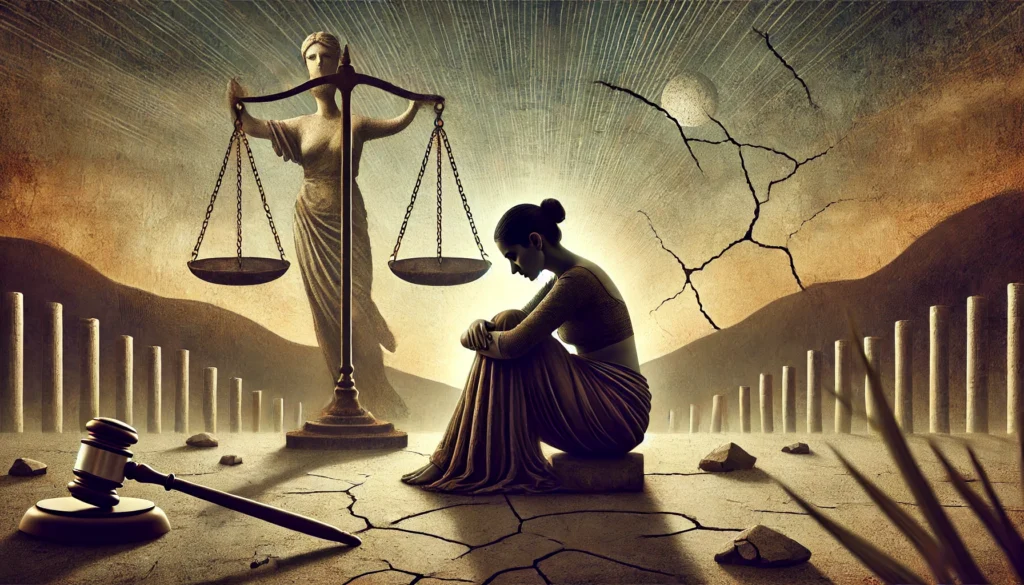Published On: 8th December, 2024
Authored By: Harapriya sahoo
SOA NATIONAL INSTITUTE of LAW
Abstract:
Sexual violence within marriage is most common and it has various forms, including marital rape[1]. Marital rape, or the act of a husband sexually abusing his wife, is a contentious issue in Indian society. Despite advancements in the recognition of women’s rights and gender equality, the Indian Penal Code (IPC) still does not criminalize marital rape. This article examines the historical background, constitutional implications, and cultural factors surrounding marital rape. We argue that the existing IPC exception clause is unconstitutional and that victims should have access to legal remedies. Marital rape, or the act of a husband sexually abusing his wife, has serious effects on the victim’s physical and mental health and violates her women’s sexual and reproductive health rights. This type of reproductive coercion involves forcing things into the vagina or anus and refraining from the violent sex that married women in India must experience on a daily basis. Based on survivors’ similar service records who visit public hospitals. These results demonstrate that a significant percentage of victims of domestic abuse had their spouses force them to engage in violent sexual encounters. Just a few women do, however, report it to the police station. This blog aims to shed light on the legal ramifications of marital rape in India as well as how victims of the crime survive.
Keywords:
Sexual violence, women, violence, marital rape, Indian society, women’s right, criminalization.
Introduction:
In India, sexual offenses against women are becoming more frequent. More than 90 young girls were raped in this country every day in 2021, according to data provided by the National Crime Records Board. Madhya Pradesh had the highest crime rate, followed by Maharashtra, Uttar Pradesh, and Karnataka. Since many parents and girls are reluctant to come forward and because rape in marriage is not illegal in India, there are actually more cases than what the data indicates. Additionally, married adult women are not included in these statistics. One of the most pernicious but sometimes disregarded phenomena in the intricate web of societal problems that beset contemporary India is marital rape.
Definition of marital rape in marriage:
All personal laws in India describe marriage as involving two people, a male and a female, engaging in sexual activity. If one spouse does not constitute the act or refuses to engage in sexual activity, the marriage may be deemed void, and the other spouse may apply for divorce. In marriage, being willing and ready for the act is not a categorical variable. There is a widespread misperception that marriage sanctifies sexual violence and grants eternal permission, but in reality, neither of these things happens. However, the idea of spousal consent—mostly women’s consent—is frequently ignored in many traditional societies, including India. This creates a vicious circle of abuse and impunity. Women’s lack of readiness and willingness is manifested in multiple spoken sentences.
Women express their lack of willingness and preparedness by using phrases like “not ready in the right mood,” “please, not now,” “I really don’t want it,” or “Please don’t insist.” If the other party uses physical or verbal coercion to get the other person to engage in sexual activity, this could escalate to rape. Although the women who are the victims of this in our patriarchal society are unable to speak up, divorce attorneys, therapists, and clinical researchers have noted the women who silently endure the behavior. This is a significant social issue because, in the majority of nations, the phrase “No means No” is adequate to classify any further advances in a sexual manner as crimes and penetration of the intimate space as rape. Many nations do not consider marital rape to be a crime. Given that rape in India is defined as a forceful, penetrating sexual attack carried out without the agreement of the victim, marital rape would be defined as such an act carried out within the confines of a married relationship.
Cultural attitudes and stigma:
In India, a patriarchal country where most groups still follow orthodoxy, the prevalence of marital rape is a result of deeply rooted cultural attitudes and social traditions. The foundation of a marriage is the belief that the man is superior to the woman and that the husband is God. We call this concept “Pati Parameswara.” These concepts provide credence to the myth that a husband, with or without his wife’s consent, can access her body whenever he pleases.
This kind of poisoned narrative contributes to the persistence of gender inequality in society as well as the normalization of sexual assault. When victims come forward or ask for help, they often have to cope with humiliation and accusations. When they do things like annoy their husbands or fail to fulfill their marital responsibilities, they are held responsible. Marriages become more challenging as a result of the stigma associated with divorce and marital problems, which traps women in abusive relationships they are powerless to escape.
Marital Rape and Indian Law
In most countries, marital rape is considered a crime and not just domestic violence or cruelty. In India, the legal landscape surrounding marital rape is fraught with ambiguity and inadequacy. India among many countries does not include marital rape as criminal offence; sexual intercourse by a man with his own wife is a exception to the definition of rape in Indian Penal Code[2]. Section 375 of the Indian Penal Code (IPC), which defines rape, includes an exception clause stating that sexual intercourse by a man with his own wife, as long as she is not under fifteen years of age, is not rape. This orthodox provision essentially grants freedom to perpetrators of marital rape, perpetuating a culture of impunity and injustice. This provision was legally challenged in Delhi High Court in 2015 and 2017, but the verdict was divided in two parts, one justice favored striking down the exception because consensual sex is fundamental to a healthy marriage, and the other did not because forced sex with a husband does not provoke the same sense of violation as forced sex with a stranger.[3] Attempts to rectify this legal loophole have been met with resistance and inertia. Despite several recommendations from various human rights bodies and women’s rights organizations, successive governments have failed to enact legislation criminalizing marital rape. The absence of legal recourse left countless women vulnerable in the abusive marriage.
Why the decision is not be a straightforward?
As is generally acknowledged, there are certain rights and obligations that spouses have in a marriage that are not codified in law. For example, having sex is an unwritten requirement of marriage, and one partner’s unwillingness to participate in an act makes it difficult for the other. Humans have a biological need for sex, just like they do for food and water. It imprinted because in the natural world, a species cannot live if it does not reproduce. In most nations, denying one spouse the opportunity to have conjugal sexual encounters amounts to denying them a basic need that cannot be met or satisfied outside of the marriage. Therefore, suppressing one’s sexual urges can be used as a weapon by one spouse against the other for physical abuse, coercion, punishment, and other reasons. Lastly, if the act criminalizes, there will be more potential for a law to be abused to settle scores pertaining to marital-in-law disputes. This would increase the dread of fake cases, as many spouses are abusing the Dowery harassment statute and submitting false cases.
Suggestions & Conclusion
A comprehensive strategy involving legal reform, raising public awareness, and providing support services for survivors is needed to address the seriousness of marital rape in India. First and foremost, the old orthodox exclusion clause in the IPC needs to be removed, and legislative action is urgently needed to make marital rape illegal. This would make it very evident that sexual assault in a married relationship is not acceptable and that the perpetrator will be held responsible for his acts. Furthermore, in order to change how society views gender and sexuality, it is imperative to make attempts to subvert deeply ingrained cultural conventions and attitudes. Additionally, there are education and awareness programs taking place in schools and colleges with the aim of debunking myths regarding marital rape and advancing gender equality, which is essential in opposing patriarchal institutions and enabling women to stand up for their rights.
Furthermore, in order to help and protect people impacted by marital rape, strongly support services such as counseling, legal aid, and victim shelters are crucial. The construction of specialist courts to address cases of sexual violence, as well as education about the judiciary and law enforcement, are necessary to provide access to justice. Finally, we need to limit our discussion to the nonconsensual sexual behavior that takes place in married relationships.
Reference(s):
[1]Padma-Bhate Deosthali, Sangeeta Rege and Sanjida Arora,’ Women’s experiences of marital rape and sexual violence within marriage in India: evidence from service records’, (2022), https://www.ncbi.nlm.nih.gov/pmc/articles/PMC8967187/, accessed 29th march 2022.
[2] T. S. Sathyanarayana Rao, Nilesh Shah, and Chittaranjan Andrade, ‘Marital Rape in India’, (2022), https://journals.sagepub.com/doi/full/10.1177/26318318221131745, accessed 31st October 2022
[3] Menon R. Women have a right to say NO! Deccan Herald. 2022;75(141):14




